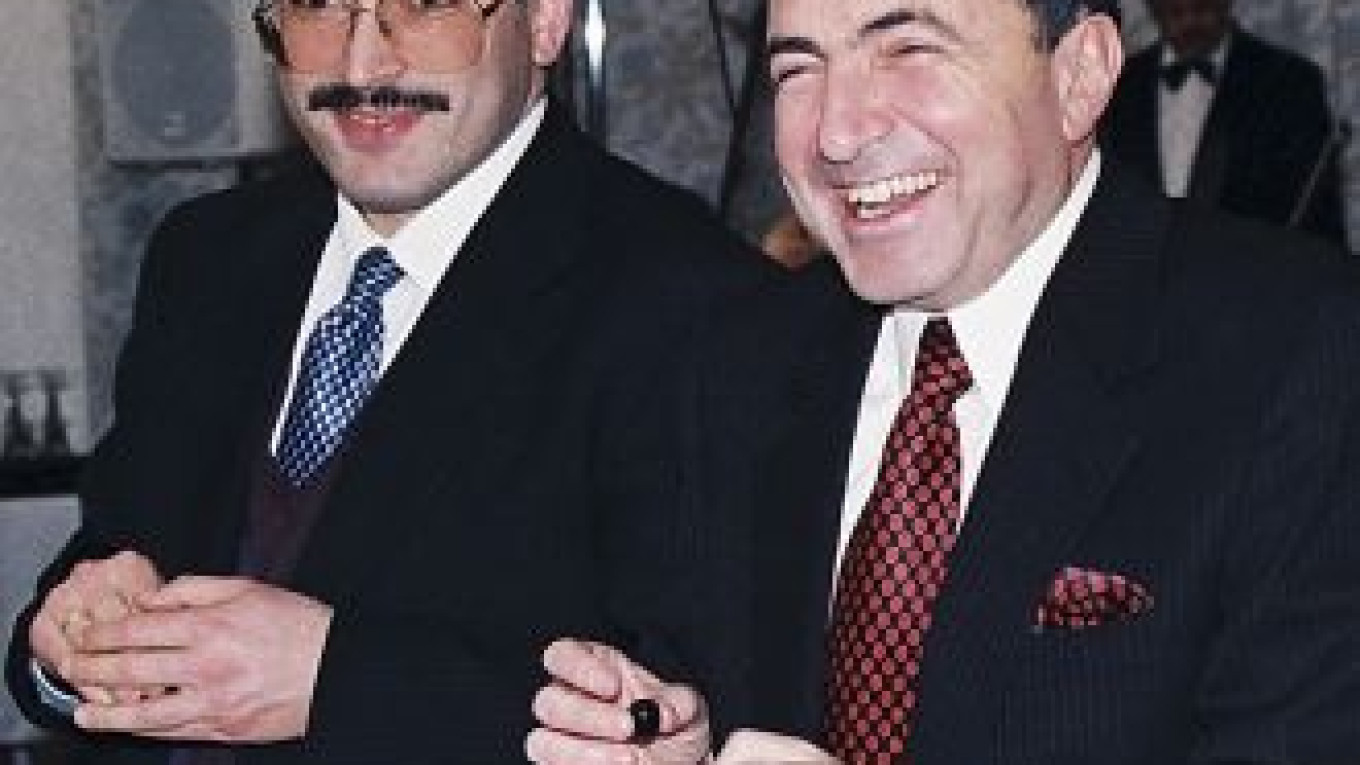"Is Boris Berezovsky the godfather of Russia's godfathers? It sure looks that way," Russian-American journalist Paul Klebnikov wrote in an article published in late 1996, the year a small group of Russian oligarchs, including Berezovsky, engineered President Boris Yeltsin's re-election.
Berezovsky, then a billionaire businessman, objected to the portrayal, sued for defamation, and won an clarification from stating that there was no evidence that Berezovsky was responsible for the killing of a prominent television journalist in 1995, "or any other murder."
By the time Klebnikov himself was gunned down in 2004, Berezovsky had received asylum in Britain to escape a slew of white-collar court cases that he said were politically motivated, and investigators, officials and state-run media had made a habit of blaming him for crimes committed back home.
In numerous television programs and public statements, Berezovsky was shown as the embodiment of the wild 1990s, when he made a fortune in part through the state's highly corrupt privatization program and became a powerful member of Yeltsin's inner circle and a key figure in President Vladimir Putin's rise to power.
"The Russian government is convinced he killed Paul. It's conceivable; he certainly was evil enough and unbalanced enough to do it. But we have seen no evidence from the Russian side," Klebnikov's brother, Peter, told shortly after learning of Berezovsky's death on Saturday.
Similarly, the government never charged Berezovsky with ordering the killings of Novaya Gazeta reporter Anna Politkovskaya and Chechen human rights activist Natalya Estemirova, claims made by a senior Investigative Committee official and Chechen head Ramzan Kadyrov, respectively.
More recently, Berezovsky was accused of being behind the 2006 poisoning death of former KGB agent turned Putin critic Alexander Litvinenko, as well as last year's performance of the Pussy Riot punk band in a Moscow church. He denied both.
The sheer number of misdeeds attributed him over the years caused snickers among some onlookers. A cartoonist Raskolnikov, the hero of Dostoevsky's "Crime and Punishment," explaining to an officer that Berezovsky killed the pawnbroker and her sister.
But Berezovsky was neither a scapegoat nor a criminal — he was both, said Mark Galeotti, a professor at New York University and a leading researcher on Russian crime.
"Of course, he did not do everything of which he was accused, but to be honest he did a lot, from his cozy deals with corrupt officials and Chechen gangsters at AvtoVAZ, through to his role in the back-pocket privatization of Sibneft. Besides which, directly or indirectly, I firmly believe there was blood on his hands. I truly won't miss him!" Galeotti wrote in an e-mail.
Berezovsky's exact role in the 1990s may never be clear; the businessman did not leave any memoirs or personal diaries, a source close to him told Interfax on Monday.
Curiously, Berezovsky at times seemed to have enjoyed, even encouraged, the black PR.
In April 2007, for example, he told the that he was fomenting revolution in Russia. "It isn't possible to change this regime through democratic means. There can be no change without force, pressure," he said, earning a rebuke from the Kremlin and Britain's foreign secretary at the time, Jack Straw.
"He thought it was better for people to say bad things about him then to say nothing at all," analyst Vladimir Pribylovsky, head of the Panorama think tank, said by telephone.
Berezovsky thought that cultivating the image of a overseas puppet master would help him solve his problems, said Gleb Pavlovsky a political analyst and former Kremlin insider.
"But this is evidence of the fact that he was not a communicative politician. He wanted to establish ties with people who could be useful to him, not with society," Pavlovsky said by telephone.
Berezovsky's financial and personal problems mounted in recent years, culminating with his losing a record $5.6 billion case against former protege Roman Abramovich in London last year.
The battle cost him $60 million — a serious dent to his dwindling fortune — and left him emotionally scarred, Alexei Venediktov, editor-in-chief of Ekho Moskvy radio, said Saturday.
Berezovsky, 67, was found dead on the bathroom floor in his estate near London on Saturday afternoon. Local police said Sunday that there was no evidence to suggest third-party involvement, and the results of an autopsy were expected .
Russian officials appeared to show leniency toward the deceased, with Putin's spokesman saying Moscow would consider allowing Berezovsky to be buried in Russia. But in other instances, it remained determined to punish him posthumously.
The Samara region government said it would continue to seek the return of 989 million rubles ($32 million) that Berezovsky and an associate owe the region, and the Prosecutor General's Office announced that it would continue to seek the return of Berezovsky's illegal assets, reported.
Contact the author at j.earle@imedia.ru
Related articles:
A Message from The Moscow Times:
Dear readers,
We are facing unprecedented challenges. Russia's Prosecutor General's Office has designated The Moscow Times as an "undesirable" organization, criminalizing our work and putting our staff at risk of prosecution. This follows our earlier unjust labeling as a "foreign agent."
These actions are direct attempts to silence independent journalism in Russia. The authorities claim our work "discredits the decisions of the Russian leadership." We see things differently: we strive to provide accurate, unbiased reporting on Russia.
We, the journalists of The Moscow Times, refuse to be silenced. But to continue our work, we need your help.
Your support, no matter how small, makes a world of difference. If you can, please support us monthly starting from just $2. It's quick to set up, and every contribution makes a significant impact.
By supporting The Moscow Times, you're defending open, independent journalism in the face of repression. Thank you for standing with us.
Remind me later.


